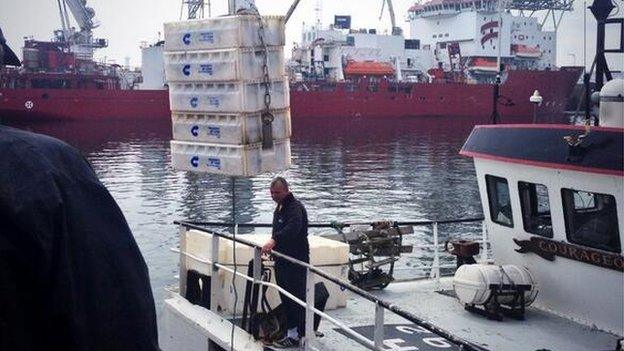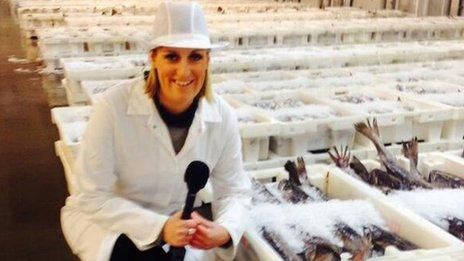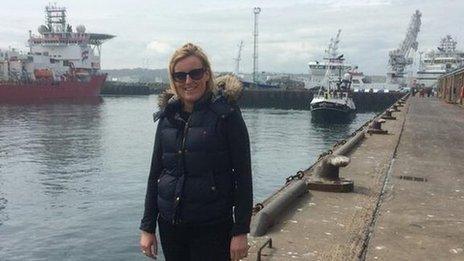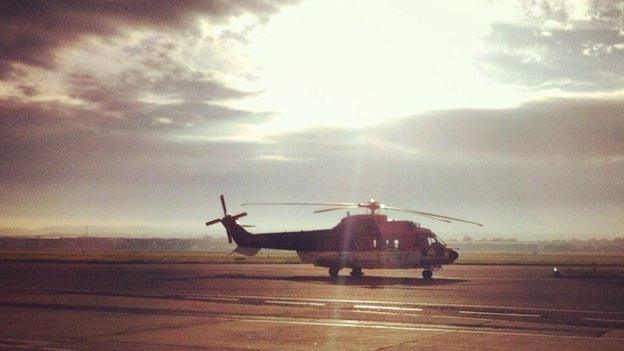Scottish independence: how food and drink shapes the nation
- Published

Peterhead harbour handles 5,000 boxes of fish a day with plans in place to increase that by another 4,000
It is officially the start of campaigning for the independence referendum and BBC Breakfast are on the road looking at the economic make-up of Scotland.
On day three, the team are in Peterhead harbour looking at the important role Scottish food and drink plays in its prosperity.
Through the mist and drizzle on the quayside, two large white fish trawlers slowly pull in.
They're trailed by half a dozen seals.
There are a myriad of gulls, squawking and diving as they try and skim off their share of the catch.
The seals' big black eyes may look innocent, but they are apparently vicious, and loathed by fishermen.
The men have been on board for two days to catch haddock, cod and other white fish to sell at Peterhead - the largest white fish port in Europe.
When people think of Scotland, it's not long before food and drink comes to mind.

Much of the fish landed at Peterhead is headed for the lucrative European market, particularly Spain
Smoked salmon, Scotch whisky, haggis, buttery shortbread - even a Tunnock's teacake or Arbroath smokie.
This is a country famed worldwide for its cuisine and trading on the provenance of its produce.
The Scottish food and drink industry is worth an estimated £13bn to the economy - and a huge chunk of that comes from exporting.
Peterhead port is the perfect illustration of that.
Last year it handled £80m worth of white fish - £130m of fish in total.
Half of that stays here in the UK to be processed, both for the country's fish and chip shops, and supermarkets.
The men working here tell us Marks and Spencer are regular visitors to the harbour.
Growing exports
The other half of the catch goes to mainland Europe, particularly to Spain, where consumers have a taste for North Sea hake.
Chief executive John Wallace tells us that they are working to promote different fish species both here and overseas.
But, by and large, you can see who likes to buy what.
It is this growing export industry that means they've just invested in a £40m extension to the market.
"At the moment we handle 5,000 boxes a day - 2,500 boxes have to wait to be traded as we don't have the space," John said.
"But once new work is carried out, we'll be able to hold 9,000 boxes. We really are predicting that there will be plenty more fish in the sea!"
Peterhead Port Authority gets half of its £10m turnover from fish and the other half supporting oil and gas logistics managed from the harbour.
It supports 9,500 jobs in the supply chain. And it is businesses like this that the Scottish government will be keen to support.

Fishermen believe the north east of Scotland could be an even bigger trading area if referendum questions over currency and the EU were answered
The latest official figures show Scotland exported £26bn of goods and services in 2012 - excluding oil and gas.
Food and drink was the biggest portion, totalling £4.7bn.
If exports are the future, clearing up a few of the big referendum questions - particularly with regards to currency and membership of the European Union - will be crucial over the coming months.
"The debate is a bit of a distraction, it's a bun fight," said John Wallace.
"I really think we could be a bigger and better trading partner if we had some answers. We're really tired of being told we can't do something - this is a really can-do part of Scotland."
Another industry fit to burst is whisky.
Beautiful country
Annabel Meikle is a whisky consultant and says firms cannot grow fast enough to support overseas demand.
She said: "Four hundred bottles of Scotch whisky are sold every single second overseas.
"Scotch whisky is really evocative of this damp and beautiful country."
In order to support that demand, Annabel says 30 new distilleries are being built following a £2bn investment in the industry.
But although so much of this sounds purely Scottish so far, it's not quite black and white.
Much of the Scottish food industry is backed by international business - from the Chinese and Norwegian-run salmon firms, to London-based Diageo and French firm LVMH who run many of the larger whisky distilleries.
And you see this beyond food and drink too.
Last hunters
Canadian, American and Norwegian firms have invested millions in oil and gas, and many English financial firms are head-quartered in Edinburgh.
When globalisation is king, it is open to debate how much of this prosperity can truly be considered as Scotland's.
Trawlerman Jimmy Buchan sums it up perfectly
He said: "Three generations ago my grandfather was feeding his nation.
"Now I'm feeding the world with my catch. We're the last of the hunters."
On Thursday's programme, the Breakfast team head down to the border near Carlisle to look at the issues affecting businesses on both sides.
- Published3 June 2014
